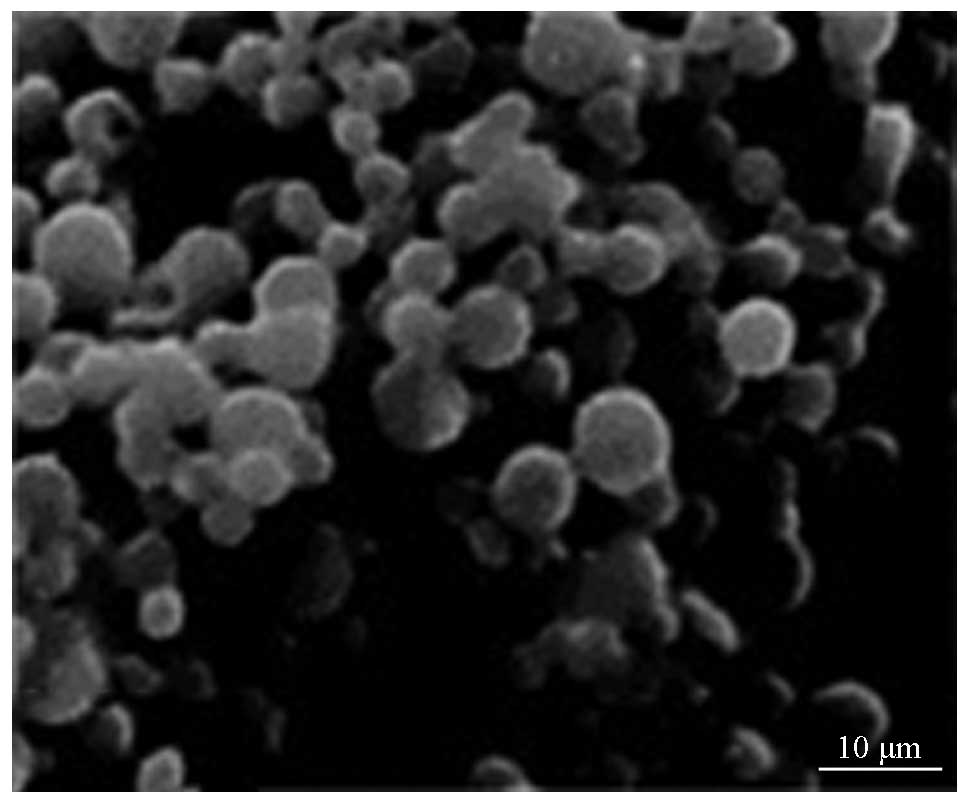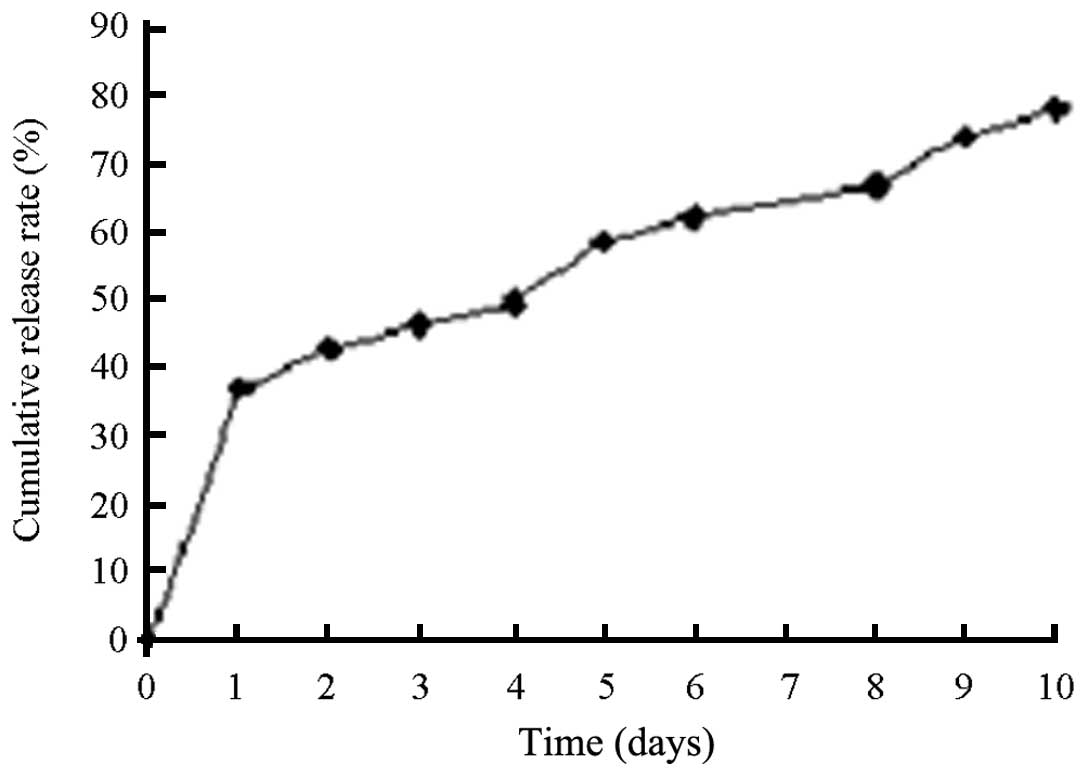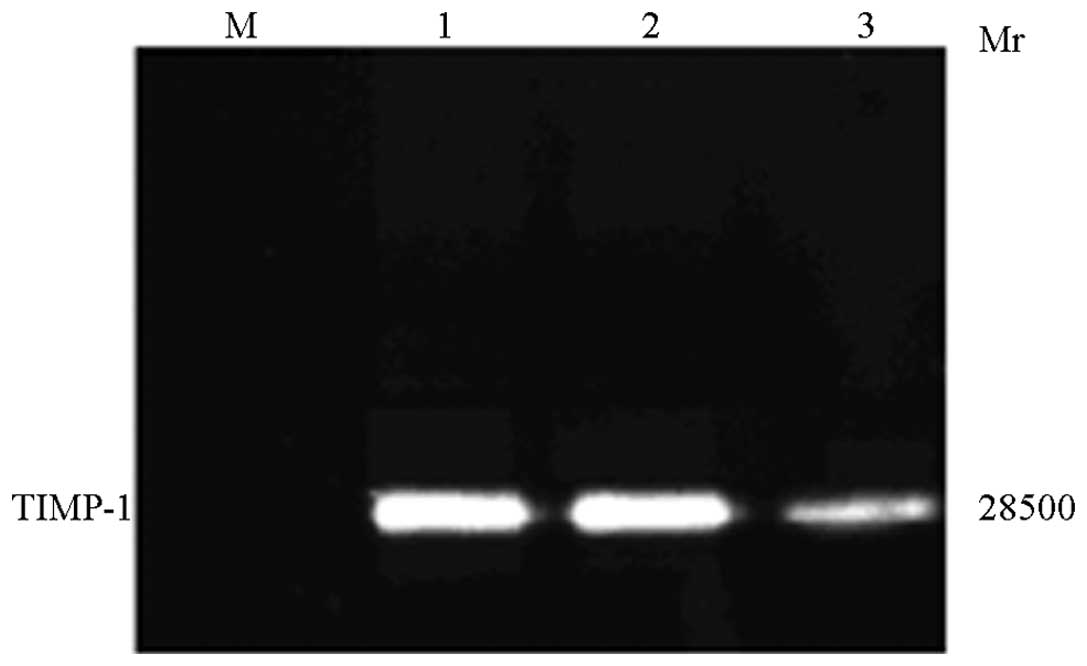|
1
|
Hernandez-Gea V, Toffanin S, Friedman SL
and Llovet JM: Role of the microenvironment in the pathogenesis and
treatment of hepatocellular carcinoma. Gastroenterology.
144:512–527. 2013. View Article : Google Scholar : PubMed/NCBI
|
|
2
|
Chen JS, Huang XH, Wang Q, et al: Sonic
hedgehog signaling pathway induces cell migration and invasion
through focal adhesion kinase/AKT signaling-mediated activation of
matrix metalloproteinase (MMP)-2 and MMP-9 in liver cancer.
Carcinogenesis. 34:10–19. 2013. View Article : Google Scholar
|
|
3
|
Giri TK, Choudhary C, Ajazuddin, Alexander
A, Badwaik H and Tripathi DK: Prospects of pharmaceuticals and
biophar-maceuticals loaded microparticles prepared by double
emulsion technique for controlled delivery. Saudi Pharm J.
21:125–141. 2013. View Article : Google Scholar : PubMed/NCBI
|
|
4
|
Chintale AG, Kadam VS, Maske KS, Raut DB,
Kale SV and Rai SD: Recent advances in microsphere drug delivery
system: a review. Res J Pharm Technol. 6:307–312. 2013.
|
|
5
|
Xia D, Yan LN, Tong Y, Wang XP, Zhang MM
and Zhao LY: Construction of recombinant adenoviral vector carrying
human tissue inhibitor of metalloproteinase-1 gene and its
expression in vitro. Hepatobiliary Pancreat Dis Int. 4:259–264.
2005.PubMed/NCBI
|
|
6
|
Xia D, Yao H, Liu Q and Xu L: Preparation
of microspheres encapsulating a recombinant TIMP-1 adenovirus and
their inhibition of proliferation of hepatocellular carcinoma
cells. Asian Pac J Cancer Prev. 13:6363–6368. 2012. View Article : Google Scholar : PubMed/NCBI
|
|
7
|
Singh A, Maurya OPS, Jagannadhan MV and
Patel A: Matrix metalloproteinases (MMP-2 and MMP-9) activity in
corneal ulcer and ocular surface disorders determined by gelatin
zymography. J Ocul Biol Dis Inform. 5:31–35. 2012. View Article : Google Scholar
|
|
8
|
Jung JS, Ahn JH, Le TK, Kim DH and Kim HS:
Protopanaxatriol ginsenoside Rh1 inhibits the expression of matrix
metalloproteinases and the in vitro invasion/migration of human
astroglioma cells. Neurochem Int. 63:80–86. 2013. View Article : Google Scholar : PubMed/NCBI
|
|
9
|
Wang ZD, Huang C, Li ZF, et al:
Chrysanthemum indicum ethanolic extract inhibits invasion of
hepatocellular carcinoma via regulation of MMP/TIMP balance as
therapeutic target. Oncol Rep. 23:413–421. 2010.PubMed/NCBI
|
|
10
|
Dai ZJ, Wang BF, Lu WF, et al: Total
flavonoids of Scutellaria barbata inhibit invasion of
hepatocarcinoma via MMP/TIMP in vitro. Molecules. 18:934–950. 2013.
View Article : Google Scholar : PubMed/NCBI
|
|
11
|
EI-Serg HB: Epidemiology of viral
hepatitis and hepatocellular carcinoma. Gastroenterology.
142:1264–1273. 2012. View Article : Google Scholar
|
|
12
|
Leonardi GC, Candido S, Cervello M, et al:
The tumor micro-environment in hepatocellular carcinoma. Int J
Oncol. 40:1733–1747. 2012.PubMed/NCBI
|
|
13
|
Remacle AG, Shiryaev SA, Radichev IA,
Rozanov DV, Stec B and Strongin AY: Dynamic interdomain
interactions contribute to the inhibition of matrix
metalloproteinases by tissue inhibitors of metalloproteinases. J
Biol Chem. 286:21002–21012. 2011. View Article : Google Scholar : PubMed/NCBI
|
|
14
|
Kessenbrock K, Plaks V and Werb Z: Matrix
metalloproteinases: regulators of the tumor microenvironment. Cell.
141:52–67. 2010. View Article : Google Scholar : PubMed/NCBI
|
|
15
|
Fukazawa T, Matsuoka J, Yamatsuji T, Maeda
Y, Durbin ML and Naomoto Y: Adenovirus-mediated cancer gene therapy
and virotherapy. Int J Mol Med. 25:3–10. 2010.
|
|
16
|
Liu X, Cao X, Wei R, et al:
Gene-viro-therapy targeting liver cancer by a dual-regulated
oncolytic adenoviral vector harboring IL-24 and TRAIL. Cancer Gene
Therapy. 19:49–57. 2012. View Article : Google Scholar
|
|
17
|
Kim KI, Park JH, Lee YJ, et al: In vivo
bioluminescent imaging of α-fetoprotein-producing hepatocellular
carcinoma in the diethylnitrosamine-treated mouse using recombinant
adenoviral vector. J Gene Med. 14:513–520. 2012. View Article : Google Scholar : PubMed/NCBI
|
|
18
|
Xia D, Zhang MM and Yan LN: Recent
advances in liver-directed gene transfer vectors. Hepatobiliary
Pancreat Dis Int. 3:332–336. 2004.PubMed/NCBI
|
|
19
|
Shiba H, Okamoto T, Futagawa Y, et al:
Adenovirus vector-mediated gene transfer using degradable starch
microspheres for hepatocellular carcinoma in rats. J Surg Res.
133:193–196. 2006. View Article : Google Scholar : PubMed/NCBI
|
|
20
|
Sailaja G, HogenEsch H, North A, Hays J
and Mittal SK: Encapsulation of recombinant adenovirus into
alginate micro-spheres circumvents vector-specific immune response.
Gene Ther. 9:1722–1729. 2002. View Article : Google Scholar : PubMed/NCBI
|
|
21
|
Bertram JP, Rauch MF, Chang K and Lavik E:
Using polymer chemistry to modulate the delivery of neurotrophic
factors from degradable microspheres: delivery of BDNF. Pharm Res.
27:82–89. 2010. View Article : Google Scholar
|
|
22
|
Blatsios G, Tzimas AS, Mattheolabakis G,
Panagi Z, Avgoustakis K and Gartaganis SP: Development of
biodegradable controlled release scleral systems of triamcinolone
acetonide. Curr Eye Res. 35:916–924. 2010. View Article : Google Scholar : PubMed/NCBI
|
|
23
|
Celik O and Akbuğa J: Preparation of
superoxide dismutase loaded chitosan microspheres: characterization
and release studies. Eur J Pharm Biopharm. 66:42–47. 2007.
View Article : Google Scholar
|
|
24
|
Madhavan Nampoothiri K, Nair NR and John
RP: An overview of the recent developments in polylactide (PLA)
research. Bioresour Technol. 101:8493–8501. 2010. View Article : Google Scholar : PubMed/NCBI
|
|
25
|
Barakat NS and Ahmad AA: Diclofenac sodium
loaded-cellulose acetate butyrate: effect of processing variables
on microparticles properties, drug release kinetics and ulcerogenic
activity. J Microencapsul. 25:31–45. 2008. View Article : Google Scholar : PubMed/NCBI
|
|
26
|
Ren Y, Zhang XJ, Chang OQ, et al: Partial
characteristics of PELA-OmpK microsphere vaccine and its immune
effect in crucian carp inoculated by oral route. Chinese Journal of
Biologicals. 11:231–236. 2011.in Chinese.
|
|
27
|
Ruan G, Feng SS and Li QT: Effects of
material hydrophobicity on physical properties of polymeric
microspheres formed by double emulsion process. J Control Release.
84:151–160. 2002. View Article : Google Scholar : PubMed/NCBI
|
|
28
|
Yang YF, Tang GW, Zhang H, et al:
Controlled release of BSA by microsphere-incorporated PLGA
scaffolds under cyclic loading. Mater Sci and Eng, C. 31:350–356.
2011. View Article : Google Scholar
|
|
29
|
Wei Y, Wang YX, Wang W, Ho SV, Wei W and
Ma GH: mPEG-PLA microspheres with narrow size distribution increase
the controlled release effect of recombinant human growth hormone.
J Mater Chem. 21:12691–12699. 2011. View Article : Google Scholar
|
|
30
|
Davidson BL, Hilfinger JM and Beer SJ:
Extended release of adenovirus from polymer microspheres: potential
use in gene therapy for brain tumors. Adv Drug Deliv Rev. 27:59–66.
1997. View Article : Google Scholar : PubMed/NCBI
|
|
31
|
Ahmed AR and Bodmeier R: Preparation of
performed porous PLGA microparticles and antisense oligonucleotides
loading. Eur J Pharm Biopharm. 71:264–270. 2009. View Article : Google Scholar
|
|
32
|
Mok H, Park JW and Park TG:
Microencapsulation of PEGylated adenovirus within PLGA microspheres
for enhanced stability and gene transfection efficiency. Pharm Res.
24:2263–2269. 2007. View Article : Google Scholar : PubMed/NCBI
|
|
33
|
Chaisri W, Hennink WE and Okonogi S:
Preparation and characterization of cephalexin loaded PLGA
microspheres. Curr Drug Deliv. 6:69–75. 2009. View Article : Google Scholar : PubMed/NCBI
|
|
34
|
Xu Q, Leong J, Chua QY, et al: Combined
modality doxorubicin-based chemotherapy and chitosan-mediated p53
gene therapy using double-walled microspheres for treatment of
human hepatocellular carcinoma. Biomaterials. 34:5149–5162. 2013.
View Article : Google Scholar : PubMed/NCBI
|
|
35
|
Kerr SH and Kerr DJ: Novel treatments for
hepatocellular cancer. Cancer Letters. 286:114–120. 2009.
View Article : Google Scholar : PubMed/NCBI
|
|
36
|
Zhu AX: Molecularly targeted therapy for
advanced hepatocellular carcinoma in 2012: current status and
future perspectives. Semin Oncol. 39:493–502. 2012. View Article : Google Scholar : PubMed/NCBI
|





















